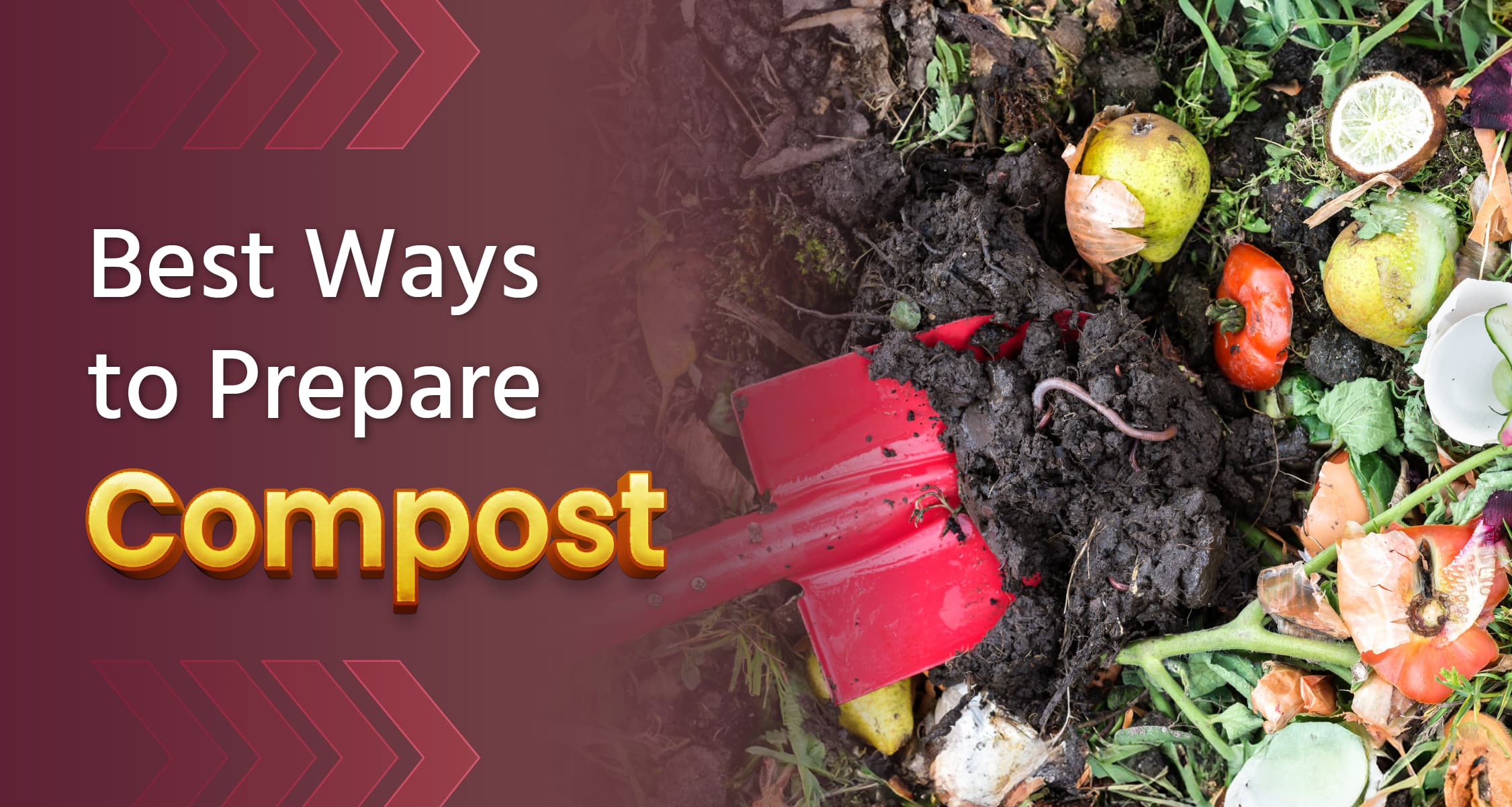Preparation of Organic Compost

The continuous use of chemical fertilizers is gradually depleting the soil's fertility. Along with this, the use of chemical fertilizers is also increasing the cost of agriculture, and farmers are unable to obtain good yields from their crops. In such a situation, using compost manure is a better option. There are many benefits of using compost manure. One of its special features is that you can easily prepare it at home at a very low cost.
Benefits of Using Compost Fertilizer
- Improved Soil Health: Compost fertilizer, rich in organic matter, enhances soil fertility, promoting better nutrient retention.
- Enhanced Root Development: Compost fertilizer aids in soil aeration, fostering optimal root growth for healthier plants.
- Nutrient Enrichment: With abundant nutrients, compost fertilizer combats deficiencies in crops, ensuring healthier yields.
- Increased Yield and Quality: Proper application of compost fertilizer results in higher yields and improved crop quality.
- Environmentally Friendly: Being organic, compost fertilizer poses no harmful effects on the environment, ensuring sustainable agriculture practices.
- Enhanced Soil Water Retention: Compost fertilizer boosts soil water retention, reducing water usage during irrigation.
- Conversion of Barren Land: Consistent use of compost fertilizer over several years can transform barren land into fertile fields for cultivation.
- Health Benefits: Homemade compost fertilizer contains no harmful chemicals, benefiting both plant health and human well-being.
- Cost Reduction: Easily prepared at home using materials like manure, grass, and household waste, compost fertilizer reduces agricultural costs significantly.
Materials Needed for Making Compost Fertilizer
To prepare compost fertilizer, both green and dry materials are necessary. The list of materials is as follows:
Green/Wet Materials
- Fruit and vegetable peels
- Used tea leaves
- Green grass
- Fresh leaves
- Leftover fodder
- Cow dung
Dry Materials
- Dry leaves
- Hay
- Dry grass
- Husk
- Wood pieces and chips
- Cardboard or paper pieces
Process of Preparing Compost Fertilizer
Compost fertilizer can be prepared in two ways: making a pit and piling up.
Detailed information about both processes is given below. You can prepare compost using any method according to your convenience.
Preparing Compost Fertilizer by Making a Pit
- To begin with, prepare a pit 3m long, 2m wide, and 1m deep.
- To retain moisture, make a water channel around all four sides.
- Then, fill the pit with leftovers from fruits and vegetables, cow dung, sugarcane peel, decomposable small plants, grass, household waste, etc., up to a height of 30 cm.
- Cover it with a layer of cow dung and sprinkle water.
- Now, spread a layer of household waste, crop residues, husk, fodder, etc., and press them down well with your feet.
- Then, spread another layer of cow dung and sprinkle water again.
- Repeat this process until the pit is filled. After filling the pit, cover it with soil.
- In about 3 to 4 months, the compost fertilizer will be ready.
Preparing Compost by Heaping Method
- Start by preparing a mound 3m long, 2m wide, and 1m tall at a raised location.
- Line the bottom with a layer of bricks or stones, extending up to 2 cm.
- Like the pit method, layer the compost materials such as waste, grass, fruit peels, etc., with a 5-10 cm thick layer of cow dung on top. Ensure proper aeration by poking holes for water to seep through.
- Repeat this process until the mound is filled, ensuring to cover the top layer thoroughly with cow dung.
- Maintain moisture levels by periodically watering the mound.
- Every 4 to 6 weeks, turn the compost heap. After turning, cover it properly once again.
- Following this method diligently, compost fertilizer should be ready within 3-4 months.
Important Factors to Consider While Preparing Compost
- Site Selection: Choose a dry location for preparing compost. Ensure there is adequate sunlight, and avoid overly damp areas.
- Moisture Level: There should be sufficient moisture in the compost pile, but avoid making it too wet. If the pile is too wet, add dry leaves, straw, or dry grass. Conversely, if the compost pile is too dry, sprinkle water over it.
- Turning the Pile: Regularly turn the compost pile to facilitate airflow, which helps in the faster decomposition of organic matter.
- Ingredients and Quantity: Use a 2:1 ratio of dry to green materials when making compost. Avoid using meat or dairy products, as they can attract pests and may affect the quality of the compost. Such materials can also slow down the composting process.
Following these guidelines will ensure that you produce high-quality compost efficiently, contributing to sustainable agriculture practices.
Have you ever prepared compost fertilizer at home? Share your answer with us in the comments. For more such information, follow the 'Desi Jugaad' channel now. Don't forget to like and share this post to spread this information to more farmers.
Frequently Asked Questions (FAQs)
Q: What nutrients are present in compost manure?
A: Compost manure contains various micronutrients such as nitrogen, phosphorus, potassium, as well as calcium, magnesium, sulfur, and others. These micronutrients are essential for the growth and development of plants.
Q: How long does it take to prepare compost manure?
A: The preparation of compost manure is a natural process. The time it takes to prepare depends on factors like the materials used, the size of the heap/pile, the moisture content, and the environment. Generally, compost manure is ready within 2 to 6 months. Sometimes, it may take up to a year for the compost to completely decompose and turn into manure.
Q: How to make compost from kitchen waste?
A: To prepare compost from kitchen waste, fill small pits or a dustbin with kitchen waste such as fruit and vegetable peels, eggshells, used tea leaves, leftover food, etc. Kitchen waste is rich in nitrogen. To balance it, add dry leaves, dry grass, pieces of paper, etc. to it. Moisten the mixture with water and cover it properly. Regularly turn the compost. In a few months, the compost will be ready for use.
Please login to continue

Get free advice from a crop doctor
